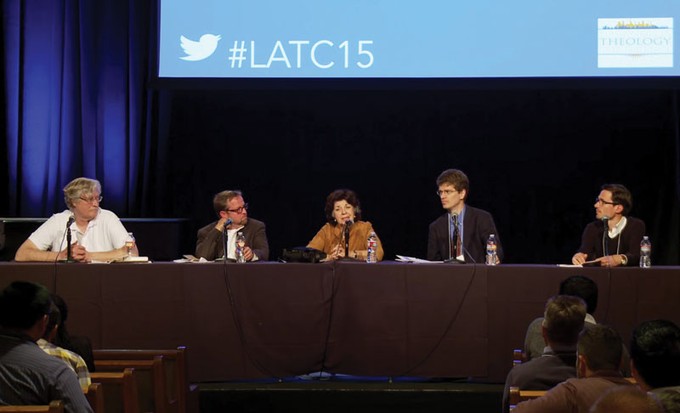
How should Christians understand the doctrine of the atonement in a broader systematic theological context? This was the question of the moment for 137 theology students, scholars and thinkers from around the world who gathered at Biola on Jan. 15–16 for the third annual Los Angeles Theology Conference. The theme of the conference, organized by Biola professor Fred Sanders and Fuller Theological Seminary professor Oliver Crisp, was “Locating Atonement,” exploring the doctrine’s connections to and implications for other doctrines like the Trinity or the Incarnation.
The conference consisted of five plenary addresses, nine breakout sessions and a concluding panel discussion. The presentations of the five plenary speakers — Michael Horton (Westminster Seminary California), Matthew Levering (Mundelein Seminary), Bruce McCormack (Princeton Theological Seminary), Ben Myers (Charles Sturt University) and Eleonore Stump (St. Louis University) — are available on open.biola.edu. Talks will be compiled in book form as well. Locating Atonement: Explorations in Constructive Dogmatics will be published this year by Zondervan.
Now in its third year, the annual January conference began at Biola in 2013, where it explored the theme of “Advancing Trinitarian Theology.” Last year’s conference was held at Fuller and focused on “Christology, Ancient and Modern.” In January 2016 the conference will return to Fuller and focus on the doctrine of Scripture. Plenary speakers for next year’s conference will include William Abraham (Perkins School of Theology, Southern Methodist), John Goldingay (Fuller), Richard B. Hays (Duke Divinity School), Amy Plantinga Pauw (Louisville Presbyterian Theological Seminary) and Daniel Treier (Wheaton College). A call for papers will be announced in May and nine papers will be selected to be presented at the conference.
Themes to be explored at future years of the conference include the task of dogmatics (2017) and theological anthropology (2018).
“It is a great boon that Biola University’s leadership have seen the value of this enterprise and invested in it for two of the three years in which the LATC has taken place,” Crisp wrote in a Reformation21 blog recap of the conference. “If the success of the [conference] is anything to go by, the age of ecumenical, dogmatic theology alive to the riches of the Christian tradition, and to contemporary restatement of central theological themes — what is often called ‘theological theology’ — is far from over. It is alive and well, and flourishing in (of all places!) Southern California.”
 Biola University
Biola University



